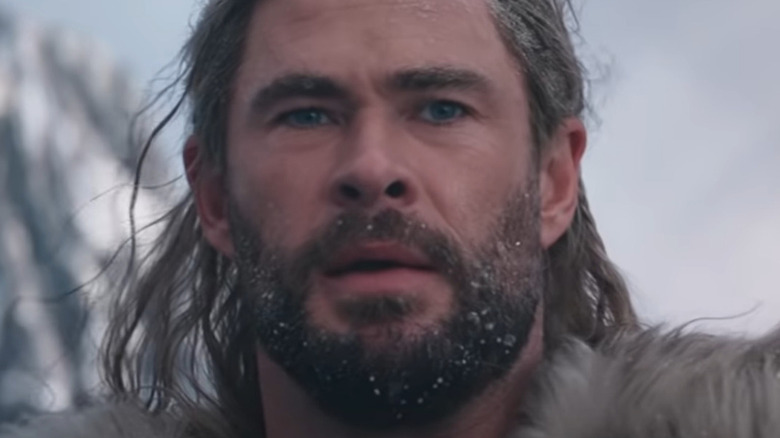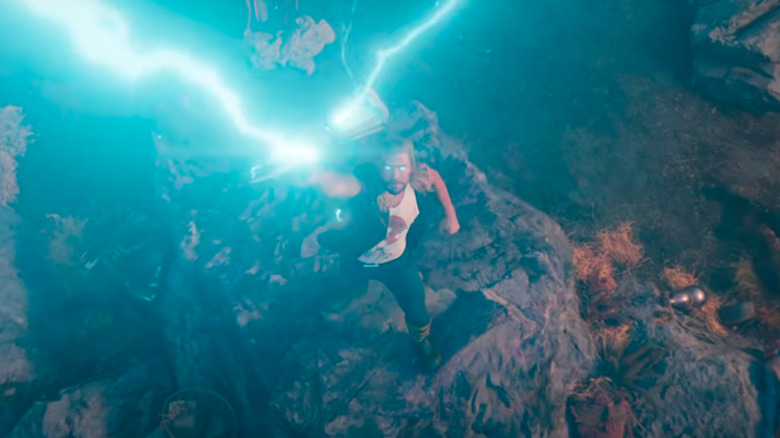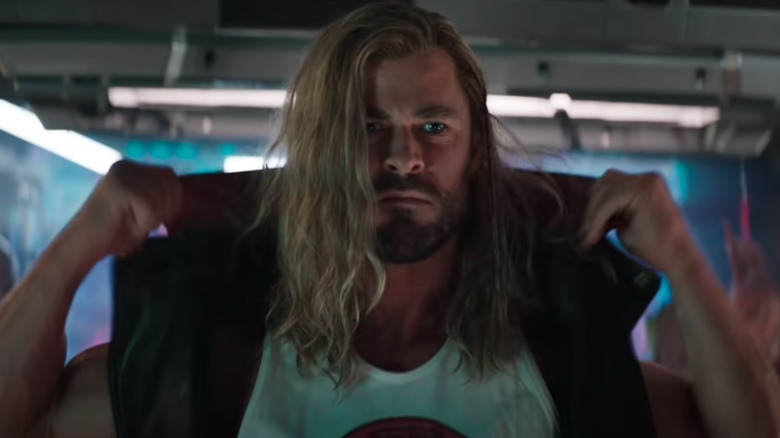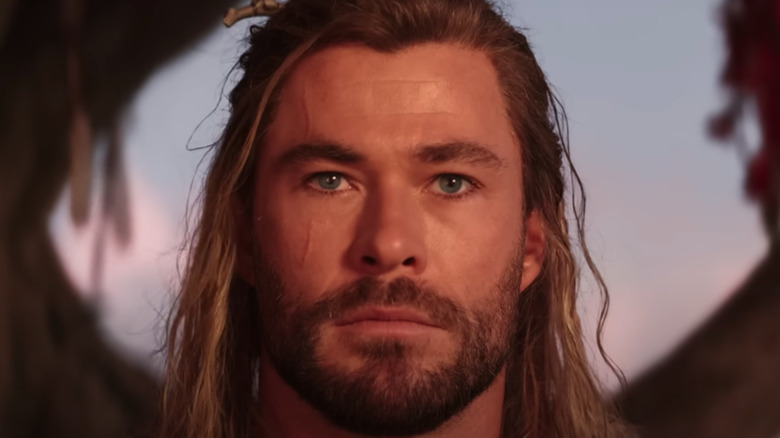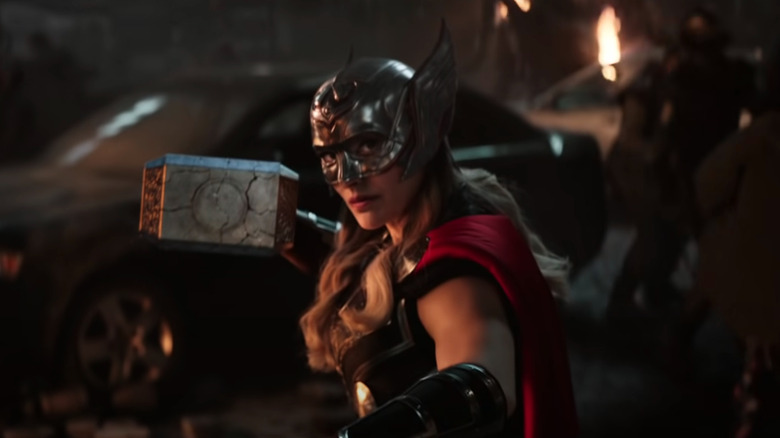Here's An Unpopular Opinion About Thor's MCU Future
Contains spoilers for "Thor: Love and Thunder"
"Thor will return," proclaims the ending of Thor Odinson's (Chris Hemsworth) latest adventure. Why wouldn't it? Thor is the last remaining original Avenger who shows any interest in active superhero antics at this point of the Marvel Cinematic Universe. Since Hemsworth is still fairly young and looks like, well, Thor, there's no reason why he can't keep playing the God of Thunder for many years to come. The question is: Should he?
The argument that Hemsworth should step down as the MCU Thor is no doubt a pretty unpopular one, given his character's prominence. However, it's not exactly unfounded. In fact, "Thor: Love and Thunder" and certain MCU works before it contain plenty of hints that Thor, as fans know him, might be about to either exit stage left ... or at least get a pretty massive update.
Let's take a look at Thor's future in the MCU, and why Chris Hemsworth's version of the character should not be a part of it.
Hemsworth's Thor is now massively overpowered
Hey, you know what's a great way to make one of a franchise's most beloved superhero teams look like absolute dorks? "Thor: Love and Thunder" knows, and does exactly that to the Guardians of the Galaxy during its opening moments.
In their own movies, the Guardians might be dysfunctional, but they're still a powerhouse of a group that has saved countless planets, and takes down giant monsters as light exercise. Here, they're reduced to mildly frustrated onlookers while Thor gleefully tears his way through an enemy force the Guardians have clearly struggled with for quite some time. It's clearly not the first time something like this happens, either, because Star-Lord (Chris Pratt) knows Thor's pre-combat catchphrase by heart.
This isn't really "Thor: Love and Thunder's" fault, though. Thor starts out in the MCU as a massively overpowered entity who could pose a formidable challenge to pretty much anyone. In films like "Thor: Ragnarok" and "Avengers: Infinity War," he gains a number of additional power boosts that effectively turn him into a weirdly literal deus ex machina. By the time "Love and Thunder" comes along, he travels across various realms as he likes, casually defeats Zeus (Russell Crowe), and even turns Gorr's hostages into an army of mini-Thors.
That's ... a lot. All the new MCU heroes rising to replace the original Avengers have little chance to prove their worth in a universe where a Scandinavian super-god can just take a couple of random kids and give them Thor powers whenever a supervillain attacks. Oh, sure, the MCU could find a way to depower him, but that would just be retreading the same ground as the original "Thor" movie. The only truly viable solution for the problem is for this version of Thor to go, or possibly take a passive mentor role like Odin (Anthony Hopkins) did.
The time of Comedy Thor has passed
"Thor: Ragnarok" saved the God of Thunder from the pits of mediocrity "Thor: The Dark World" cast his solo movies into. The buddy chemistry with Hulk (Mark Ruffalo) and the bright, comedic tone revitalized the character, as well as allowed Hemsworth to have fun in the role.
However, as any 1980s action hero who has tried their hand in comedy can tell, the "funny musclebound hero" trope is a difficult balancing act, and judging by the mixed critical response to "Thor: Love and Thunder," Thor is now drawing dangerously near wackiness overdose territory. Another Goofy Thor movie could very well cross the line and turn the audiences against this particular take on the character, no matter how good it has been and how well Hemsworth plays the part.
This, of course, creates a problem. There's no easy way to return the character to his original Melodramatic Thor mode after the grand success of Taika Waititi's more comedic take. Yet, as his interactions with the Guardians of the Galaxy in this movie show, he's starting to be so silly that his antics command all the attention even when he's with a group of characters who are tried and tested scene-stealers themselves. More importantly, when he actually has to be serious himself, it can be hard to take seriously when you know that he's just going to be a goofball again a few scenes down the line.
It's a difficult dilemma, and when you combine his oversized powers with the difficulties in tone, it's pretty clear that Thor as fans know him may not fit the future of the MCU.
Thor already got his happy ending
The first "Thor" movie introduces the viewers to an arrogant, youthful God of Thunder who has already lived a long time, but has clearly learned very little. It also introduces Thor to Jane Foster (Natalie Portman), his only real romantic interest across the various MCU movies he appears in (blink-and-you-miss-it cameos of pirates and wolf ladies notwithstanding). After his lengthy story with Loki (Tom Hiddleston) ended, Thor has two long-term character arcs left: A personal development one, in which he has to mature into a worthy adult, and a romantic one with Jane. As "Thor: Love and Thunder" comes to a close, both of these stories have ended, and with that, Thor's story is effectively over.
Sure, the movie teases a new beginning, thanks to his newfound fatherhood of and partnership with Gorr's resurrected daughter, Love (India Rose Hemsworth). However, doesn't it actually seem more like a happy ending? Thor may have lost Jane and doesn't sit on the throne of Asgard, but he's finally found the love he's always sought in his new role as a father ... and since Love also has divine powers, he can still go nuts fighting bad guys of various realms.
Though it's Jane who actually enters the hallowed halls of Valhalla in the end of the movie, Thor's ending seems like a paradise custom designed for him. The fact that Love's actor is Hemsworth's real-life daughter only adds to the vibe that the ending shows Thor moving for greener pastures, making way for the younger generation as he fights evil in faraway locations ... and, perhaps, learns how to make pancakes that Love will finally deign to eat.
There are many other Thors to explore
But what about that "Thor will return" text, or the Hercules (Brett Goldstein) mid-credits teaser? Surely, these imply that the Odinson will be back in some shape, form or way? It's entirely possible. However, whether the returning Thor will be the Chris Hemsworth version is another matter entirely.
Apart from Jane Foster's Mighty Thor, there's an absolute wealth of comics Thors and Thor-adjacent characters who could take the original's place — and some of them are already more or less canon in the MCU. One of the Grandmaster's former champions in "Thor: Ragnarok" looks a whole lot like Beta Ray Bill, and Frog Thor makes a brief cameo in the Disney+ show "Loki." Really, any of the many Thors of Marvel could potentially tag in while the original frolics on the galactic battlefields with his adopted daughter.
The most logical way to introduce whatever Thor may come would obviously be the Multiverse, which has already been heavily explored in MCU works like "Loki," "Spider-Man: No Way Home," and "Doctor Strange in the Multiverse of Madness." When or if this happens is anyone's guess, but when you put everything together, it certainly seems that Chris Hemsworth has never had a better chance to leave the MCU behind than right now. The plot and the character are both in the right place, there are plenty of potential successors in line ... and, as it happens, Hercules would make a pretty cool starter antagonist for the next Thor.
